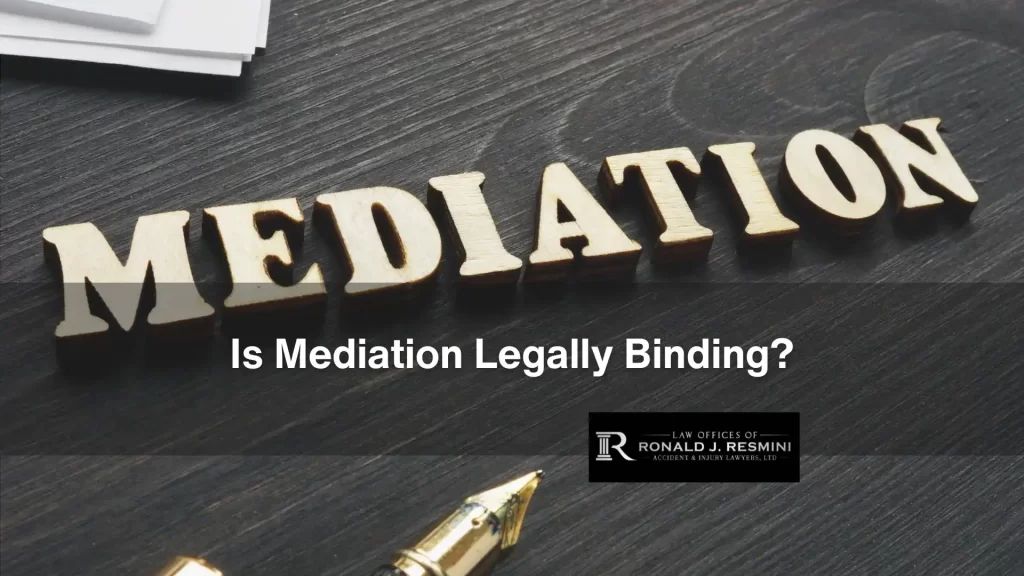 Mediation can be helpful in resolving legal disputes. It is not legally binding unless the parties enter a settlement agreement, also sometimes referred to as a mediation agreement. Mediation can also be legally binding if it is court-ordered. However, that is rare in personal injury cases.
Mediation can be helpful in resolving legal disputes. It is not legally binding unless the parties enter a settlement agreement, also sometimes referred to as a mediation agreement. Mediation can also be legally binding if it is court-ordered. However, that is rare in personal injury cases.
What Is Mediation
Parties use mediation as an alternative dispute resolution to promote open and honest conversations in a confidential setting. It is a popular form of dispute resolution because of its many benefits, including:
- Confidentiality
- Informal conversation
- Reduced cost, compared to trial
- Speedier resolution than going to trial
- Not legally binding until an agreement is signed
During mediation, the parties will present their cases in the presence of a neutral third party known as a mediator. The mediator’s role is to:
- Reduce tension between the parties
- Provide guidance during mediation negotiations
- Provide suggestions for a resolution to the parties’ disputes
While a mediator is allowed to provide suggestions for potential resolutions, nothing they say is binding on the parties, nor is anything that the parties say in mediation binding. For example, if one party says, “Well if you waived your claim to x, I would be willing to pay you y.” The statement is not legally binding unless a mediation agreement is entered that lists that item as part of the terms.
Does Mediation Mean Settlement?
In a word, no. Mediation is a means to facilitate settlement, but going to mediation does not guarantee that a settlement agreement will result.
How Does Mediation Work?
Mediation will typically begin with introductions of all parties by the mediator and opening statements made by each party. During the opening remarks, each party will discuss their case, their request, and any evidence they could use during trial. After the opening statements, the mediator will generally move the parties to separate rooms.
At that point, the mediator will move from room to room, discussing the strengths and weaknesses of the case and potential resolutions with each side to work to arrive at an agreeable settlement. If the parties reach a mutual agreement during mediation, the attorneys will memorialize the agreement in a legal document called a mediation agreement or a settlement agreement.
What Is a Mediation Agreement?
A mediation agreement is a legal document that details the resolution the parties reached during mediation. A mediation agreement becomes binding once both parties sign it. Therefore, you should thoroughly review mediation agreements before signing them, as the contract becomes legally enforceable once you sign the document.
In some circumstances, a mediation agreement will be found unenforceable. Those circumstances include:
- Mental incapacity: Any agreement entered by someone who is mentally incapacitated will likely be unenforceable if they were mentally incapacitated during mediation. Mental incapacity means that a party cannot understand the benefits or consequences of their decisions.
- Undue influence: If someone entered an agreement because someone persuaded them to through trickery or deception, the agreement could be unenforceable because it was not technically voluntarily entered.
- Duress: If someone entered an agreement because they thought if they didn’t, their life or someone else’s would be in danger, the contract could not be enforced.
- Fraudulent misrepresentation: If any party to the agreement misrepresents any material facts during mediation, any agreements reached could be considered unenforceable.
What If One Party Violates the Mediation Agreement?
Once all parties sign the agreement, it becomes an enforceable contract. If you violate the mediation agreement, someone can file or refile the original lawsuit or filing additional claims for breach of contract.
What If Mediation Is Not Successful?
 If mediation does not end with the parties signing an agreement, mediation will not be binding, and anything said during mediation is confidential. Just because you don’t settle your case in mediation doesn’t mean you can’t negotiate a settlement agreement before the trial ends with a verdict.
If mediation does not end with the parties signing an agreement, mediation will not be binding, and anything said during mediation is confidential. Just because you don’t settle your case in mediation doesn’t mean you can’t negotiate a settlement agreement before the trial ends with a verdict.
If you fail to reach an agreement during mediation or before trial, your case will likely end up in court. At that point, the judge or jury can make a final, legally binding decision. If you don’t want someone else to decide your case, you should take mediation seriously.
Our Personal Injury Attorneys Are Here to Help
Just because mediation is not legally binding, don’t fail to take it seriously. In a personal injury case, mediation can be a way to successfully reach a fair settlement by allowing parties to discuss their case in the presence of an unbiased third party. The experienced attorneys of The Law Offices of Ronald J. Resmini, Accident & Injury Lawyers, Ltd. are ready to discuss your legal options and help you get the best outcome possible for your case during mediation.
Call us at (401) 444-4444 or contact us online for a free case evaluation.
